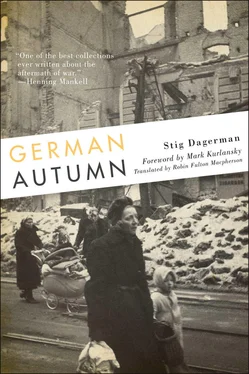Fräulein S. tells a lie and says we are looking for a family called Müller. The woman has scarcely noticed that we have come in. Without looking up from the pot she says that Hans cannot go out today because he has no shoes.
‘How many of you live here?’ Fräulein S. asks and steps forward to look in the pot.
‘Nine,’ says the tired woman, ‘eight children and myself. Deported from Bavaria. Lived here since July. This week we were lucky and got wood. Last week we were lucky and got potatoes.’
‘How do you manage then?’
‘Like this,’ says the woman, lifting the ladle from the pot and gesturing hopelessly round the cell. Then she begins stirring again. The smoke stings our eyes. The boy lies still and quiet as death on the bed, staring up at the ceiling. The woman does not notice when we leave.
The entire prison is full of families who were evacuated from Hamburg to Bavaria in 1943 and then expelled by the Bavarian government in the summer of 1946. I think I detect a melancholy satisfaction in Fräulein S.’s voice when we return to the open air.
‘The English could still have helped us. They had the chance to show what democracy is but they didn’t take it. You see, Mr D., it would have been another matter if we Germans had been living a life of abundance and luxury in the Hitler years, but we were poor, Mr D. And the fact is we have lost everything: homes, families, possessions. And how do you think we suffered during the raids! Do we need to be punished more — haven’t we been punished enough already?’
We visit a cellar beneath a shoemaker’s workshop where three people and an infant live in a foul-smelling windowless room. I recall what a wise German said about the often lamented absence of guilt feelings in the civilian population of Germany (it was slightly different in the case of the soldiers).
‘Perhaps we know that it began in Coventry but we were not there. We were there in Hamburg, and it was in Berlin and Hannover and Essen we went through three years of mortal fear day after day. This lack of guilt should be regretted, it need not be understood, but one ought to keep in mind that one’s own sufferings make it more difficult to understand other people’s sufferings.’
Fräulein S. and I end the day in a former school lavatory in Altona. The school is in fragments but in the lavatory in the playground there lives a Sudeten-German family with three children. The man searches for wire in the ruins and earns a living by selling the ornaments he makes with the wire. It looks surprisingly neat in this urinal and the man is touchingly happy about having at last got his own home, and he tells us without any false sympathy how pleased he was when he eventually managed to persuade the ‘tenant’ who lived here before him to move out. At that time the urinal was still a urinal and this previous ‘tenant’ gave up when in the course of a short period TB robbed him of his mother, his father, his wife and his daughter in the school lavatory in Altona. Before we return to the centre of Hamburg Fräulein S. takes me to a street that runs past a Jewish cemetery. The cemetery has been bombed, the gravestones are broken off and sooty. In the background there is a mutilated church with black walls. A few people in mourning kneel before fresh dark mounds of earth.
Then Fräulein S. says: ‘This is Germany, Mr D., a bombed cemetery. When I pass this way I always stop for a little and look.’
It is a devotional moment or two I witness here in this little street in Altona, a brief minute of happiness for someone who thanks God because she is allowed to live in hell.
But when I discreetly turn away to leave her alone with her bitter happiness I read on a huge banner stretched across the wall of a ruin a giant advertisement for The Merry Widow. Widow, yes — but merry?
Deep within a neglected park on the outskirts of Hamburg there lives an ageing liberal lawyer together with a writer of picaresque novels. The park is in an area of Hamburg where the streets have no other lighting than the headlamps of English vehicles as they prowl past. In the darkness you bump against invisible arms or hear invisible words in passing and with a shiver you remind yourself of the advice given by experienced correspondents — not to venture out on the dark streets of Hamburg without the company of a revolver. The park is a wilder place than it seems in daylight, but at last you reach a safe flight of steps, you ring the bell and are admitted to a large better-class hallway with an umbrella-stand and a Silesian maid. In the lounge the ornamental timepiece, the metres of gold-edged morocco-bound volumes in the bookshelves, the dense carpet, the chandelier, the leather armchairs — none of this gives one hint of the bombing and the desperate housing shortage. And what about the lawyer and the writer?
The most cherished slogan of current middle-class election propaganda is the claim that the defeat has abolished classes in Germany. The labour parties are reproved for using a mere fiction as a cudgel in their fight against bourgeois resistance. In fact it was no coincidence that during the election in the autumn of 1946 the battle-cries of class warfare echoed with particular bitterness. The thesis of a classless Germany involved a cynical exaggeration. After the collapse, class frontiers have been sharpened rather than blurred. The bourgeois ideologists confuse poverty and classlessness when they assert that by and large all Germans are financially in the same desperate straits. In one way it is true that most Germans are poor and that many who used to be well-heeled are now down-at-heel, but in Germany there is a difference between the least poor and the most poor which is greater than the difference between those who own much and those who own nothing in a more or less normally endowed society.
While the most poor live in the cellars of ruins, in bunkers or in one-time prison cells, and the middling poor crowd together in the abandoned tenements one family to a room, the least poor live in their old villas (like the liberal lawyer and the writer) or in the town’s most spacious apartments, where not even the middling poor can afford to live. The lawyer is of course right when he says that the English bombs crossed the frontiers of class, even if, as was natural, the less densely populated residential areas came off more lightly than the packed tenements. But in defence of the class struggle one ought to add that the bank accounts were not bombed. Admittedly, bank accounts are blocked in such a way that it is impossible to draw more than 120 marks per month, a modest sum when you think that that is precisely the price of half a kilo of butter on the black market. Here too for the sake of justice one ought to add that the average wage can amount to 120 marks per month, and that money hoarded at home for safety quite simply escapes the eye of authority.
And this leads to the most absurd, incredible and unfair consequences. A common judgement in the denazification trials is that the accused, if he has been active as a Nazi, is deprived of his apartment, which is then allocated to someone who has suffered political oppression. The gesture is fine, but alas often meaningless, because economically anyone who has suffered political persecution finds himself somewhere between the middling poor and the most poor and simply cannot pay the rent for a large ex-Nazi apartment, which is now taken over instead by people with money, and that means people who earned money under the aegis of Nazism.
The liberal lawyer and his friend the writer of picaresque novels have never been Nazis. Before 1933 the lawyer belonged to the old Liberal Party and the writer is one of the very few best-selling authors who during the Hitler years preferred to live off their money rather than write. As we drink tea without sugar and eat a cake which beneath its layer of carefully counterfeited cream turns out to be the usual bad German ersatz bread, the lawyer reveals, under his silver-haired surface of resignation, a passionate sense of disillusion which is quite rare among the bitter indifference so common in Germany and which in normal countries would be attributed to youthful hysteria. It seems to be a part of good German post-war breeding in certain middle-class circles that not-so-young gentlemen relate how they have spent the last twelve years with one foot in the concentration camp, a habit to be found also in the worst circles, those of the still-to-be-denazified. What is even rarer is to hear those words expressed with genuine rather than false pathos, but this master of fragile resignation who leans over the equally fragile Meissen porcelain has developed the art to a nicety.
Читать дальше












